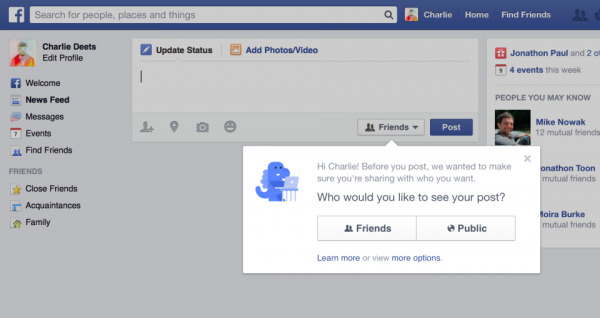Is Facebook's Privacy Update Welcome Or Whitewash?
Listen to Mark Zuckerberg & Co., and Facebook's privacy changes this week are not only benign but in your very best interest. A pared down explanation on data protection that's ostensibly clearer than before, as well as a guide to exactly what the privacy settings can do, were the sweetener to the side news that Facebook would actually be doing more information sharing, at least between its recent acquisitions like Instagram and WhatsApp. Problem is, we've heard those same explanations before, and they've already got at least one big company into very hot water.
On the face of it, Facebook's changes are straightforward. The existing privacy policy was too long and so nobody read it, so the argument went, and so it's been sliced & diced into something considerably shorter.
Meanwhile, since there are already plenty of privacy options that users simply aren't taking advantage of, there's a friendly guide to walk through everything from the basics of what email notifications you get, through to who sees your posts and what adverts show up in your news feed.
Oh, and since Facebook now has a couple more properties in its portfolio, like hit photo-sharing app Instagram and multi-million user IM client WhatsApp, it makes sense to tweak the permissions so that user information can be shared between each silo.

Unsurprisingly, though, the "simple" changes haven't been met with universal acclaim. In fact, Facebook should probably flick a few pages back to see how Google fared in its own privacy revamp two years ago.
Back in January 2012, Google revealed it would condense several dozen individual privacy policies into a single document, while also discussing how each different service would exchange data held on the same user. The goal, Google argued, was to make more intelligent use of that knowledge: you location, combined with a weather forecast and the contents of your calendar, might be enough that your phone could remind you to take an umbrella to your next appointment, for instance.
As with Facebook, no extra data was being collected. Still, Google faced incredible amounts of pushback, first from privacy advocates and then from the legislators as the European Union weighed in.
Greater transparency around privacy expectations is a good thing, though it's unclear whether – for all they complain about it – the public actually bothers to take advantage of the settings and options they already have. Facebook has certainly tried to kickstart that in the past, offering privacy check-ups to those who have generally taken a "set and forget" approach to the sharing controls.
Nonetheless, as Google found to its cost, even trying to improve privacy understanding can end up simply drawing attention, not all of it good. Facebook says it's looking for feedback until November 20th, but it may discover it has invited more oversight than it expected.
